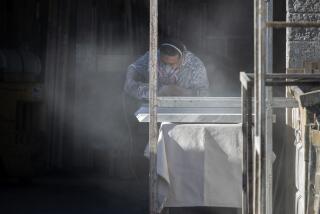Koop Smoking Report Stresses Bystander Risk
- Share via
WASHINGTON — Surgeon General C. Everett Koop, in the strongest indictment yet of environmental tobacco smoke, Tuesday called for establishment of smoke-free workplaces and said the evidence is clear that “involuntary smoking” can cause lung cancer in nonsmokers.
“If this evidence were available on another environmental pollutant--other than environmental tobacco smoke--we would have acted long ago,” Koop said at a press conference called to release the annual surgeon general’s report on smoking. “To fail to act now on the evidence we currently have would be to fail in our responsibility to protect the public health.”
The report is the 18th since the landmark document of 1964 that first reported the health risks of cigarettes, and the first to address the effects of “passive” smoke on nonsmokers. “The report, therefore, is addressed to everyone--smoker and nonsmoker alike,” said Koop.
Attacked by Tobacco Industry
The report was immediately attacked by the tobacco industry and by the presidents of five AFL-CIO labor unions.
Koop, in his six years as surgeon general, has led a tireless crusade against tobacco use, and has traveled the country to promote his idea of a smoke-free society by the year 2000.
Thirteen studies linking environmental tobacco smoke to lung cancer in nonsmokers have appeared in scientific literature during the last five years, he said, and 11 of them have demonstrated a “positive association” between environmental smoke and lung cancer in nonsmokers.
“It is now clear that disease risk due to inhalation of tobacco smoke is not solely limited to the individual who is smoking, but can also extend to those individuals who inhale tobacco smoke in room air,” Koop said. “ . . . Involuntary smoking can cause lung cancer in nonsmokers.”
He said that more than 30 years of research has established that tobacco smoke is a carcinogen, or cancer-causing agent, and that many toxins and carcinogens are present in greater amounts in “side stream” smoke from a burning cigarette than in the “mainstream” smoke inhaled by the smoker.
Koop said that an accurate estimate of the number of lung cancers caused by environmental tobacco smoke “will require more detailed information of the quantity and duration of the exposures occurring in the U.S. population,” but that estimates of other groups “suggest that this number is between several hundred and several thousand lung cancer deaths per year.”
Tobacco Spokesman’s View
Speaking for the tobacco industry, Scott Stapf, assistant to the president of the Tobacco Institute, declared: “The science is not there to support (the report). It’s easy to see how his politics could have blinded him to the science. He is hell-bent on getting to his goal of a smoke-free society and has made it clear he’s not going to let science stand in his way of getting there. “
The union leaders said that environmental smoke “can be relieved in nearly all cases by improved ventilation,” and that Koop’s “relentless pursuit of a political agenda on the smoking issue calls into question much of his credibility.”
Koop referred to a National Academy of Sciences estimate that about 2,400 lung cancer cases among nonsmokers each year could be attributed to environmental smoke, and he added: “This compares to between 1,300 and 1,700 new cancer cases (of all kinds) resulting from air pollutants in the general environment.”
The report also said that children exposed to tobacco smoke in the home run an elevated risk of respiratory infections, a conclusion identical to that of the National Academy of Sciences, reported in November, and that separating smokers from nonsmokers within the same air space “may reduce, but does not eliminate,” involuntary exposure.
No-Smoking Rules Urged
“The right of the smoker to smoke stops at the point where his or her smoking increases the disease risk to those occupying the same environment,” Koop said. He said that the data in the report “lead me to conclude that the simplest, least expensive and most effective way to accomplish this protection is to establish a smoke-free work site.
“The goal should not be to punish the smoker, but to protect the health of the nonsmoker.”
Koop’s report was endorsed Tuesday by the American Cancer Society, the American Heart Assn. and the American Lung Assn. “We think this report is as significant as the first surgeon general’s report in 1964 because it affects virtually every American,” said Matthew Myers, staff director of the Coalition on Smoking or Health.
Labor Critics Identified
The labor union statement criticizing the report was signed by William W. Winpisinger, president of the International Assn. of Machinists and Aerospace Workers; James L. Walker, president of the International Brotherhood of Firemen and Oilers; John DeConcini, president of the Bakery, Confectionery and Tobacco Workers International Union; Edward J. Carlough, president of the Sheet Metal Workers International Assn., and Patrick J. Campbell, president of the United Brotherhood of Carpenters and Joiners of America.
Koop also urged that state and local governments, airlines and others restrict or ban smoking in public places. “I’d like bans wherever bans are possible,” he said. “If we can’t have bans, I recommend separating smokers from nonsmokers. Smoking is becoming more and more socially unacceptable in public places.”
Koop said that smoking causes more than 300,000 deaths each year in this country, or 15% of all deaths.






